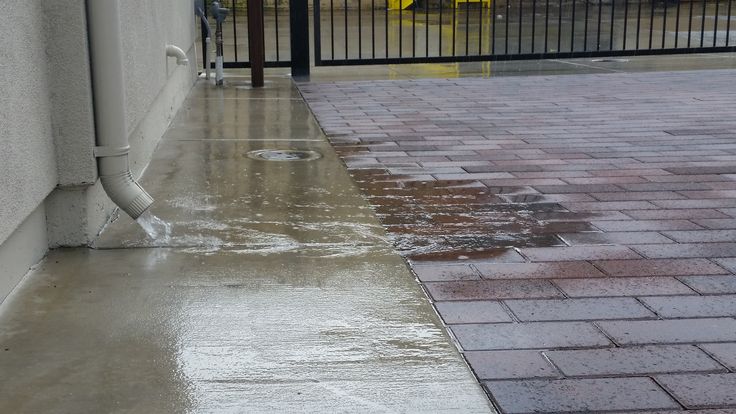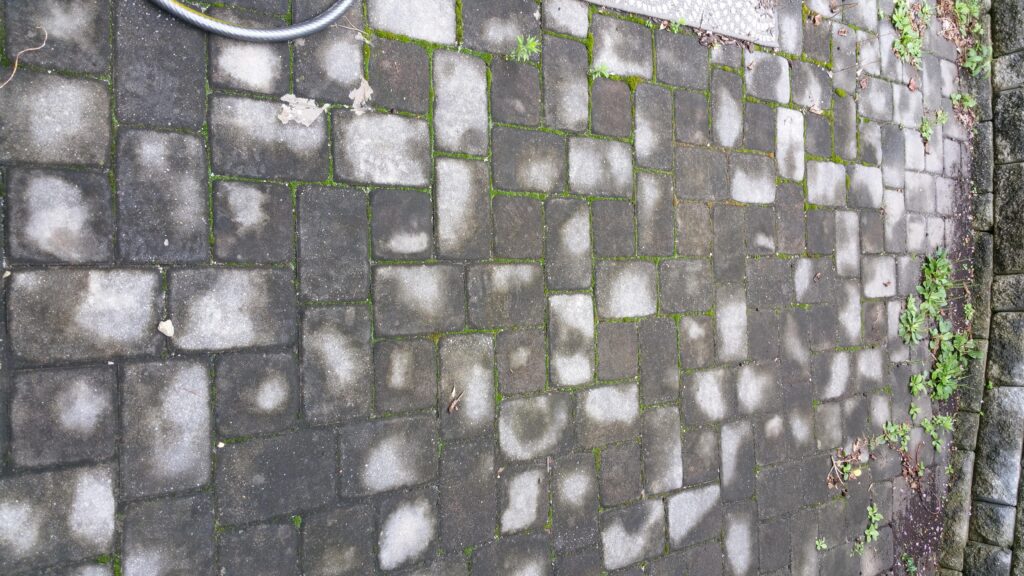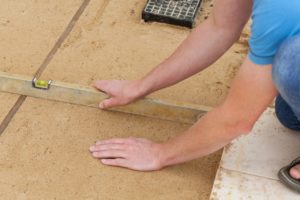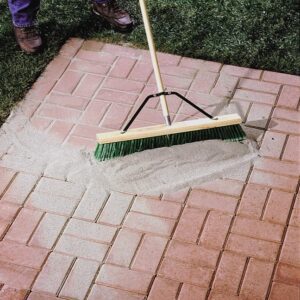Pavers are a staple in the hardscape industry. The advantages of it are not a secret anymore. Compared to other alternatives, like poured concrete, pavers prove to be vastly superior in all categories. But what about drainage? Does water drain through paver base?
Answering that question might be complicated. Yes, a paver installation does allow water to be drained through its base. However, that can be changed if you want it to, to some extent.
You can develop your installation in a way that minimizes the absorption of water between your pavers and redirects the water that do goes through directly to your sewage system.
Furthermore, you can even allow for complete drainage and use permeable pavers in combination with a water recycle system, which really is a marvel in paver technology.
So let’s present you with both ideas and hopefully clarify your questions about water drain through paver base.

Jump to:
Does Water Drain Through Paver Base: Installation Rules
Even when you want the water to be drained, as in the case of a permeable installation, there are still some rules you need to follow.
At the moment of the installation, still in the initial phase, when you’re digging the ground, it is very important that you create a slope. The establishment of proper slope will avoid drainage issues and the accumulation of water in puddles.
Creating a slope is really simple:
- First, you’re going to place a wooden stake at the start of your installation, on the side that is closest to the main building in the area.
- Then you’re going to place a second stake at the opposite side of the installation.
- Now get a construction line and tie one end of it to the first stake, the one closest to the main building. The height of this line should be equal to the height you want your paver to be.
- Get the other end of the line all the way to the second stake and tie it as well.
- Now measure the distance between the stakes. For every 4 feet of distance, you place the line on the second stake 1″ lower.
- Now, if you follow that line as a guide, you will dig with proper slope.
Also, if you decide to go for a permeable installation, we really recommend you contact qualified hardscape professionals in your area to help you.
A permeable paver installation requires a lot of steps, precise panning and a careful analysis of the soil. On small mistake can cost you time, money and give you huge headaches in the future.
Regular Paver Base Installation
Drainage is the worst enemy of a regular paver installation.
Bad drainage can compromise the structure of the entire project, leading to sunken pavers and problems with weeds. If you don’t protect your installation properly, water will drain through the paver base, and that is the last thing that you want.
So, for starters, you want to establish a proper slope during excavation, which we already covered.
Second, when you are buying your pavers, check if they have built in spacers. If they don’t, check what is the recommended distance that should be left between them and buy spacers separately according to that distance.
Proper space between pavers is one of the most overlooked factors in paver isntallations.
If the pavers have built in spacers, there’s not much mystery to it, you couldn’t place them closer even if you wanted to. These built in spacers, most commonly present in concrete pavers, are small “crevices” that avoid the pavers from touching each other.
At the moment of the installation, you should place the pavers close enough to hear a “click” sound, and then gently place them on the ground. That is the famous “click and drop” method. Keeping the pavers perfectly apart from each other.
If you don’t have these spaces built in your pavers, no problem. You can easily buy them and use them as a guide to place the pavers at a proper space from each other.

The Importance of Proper Space Between Pavers
Either way, you’ll want to make sure you have proper space between your pavers?
Why is that so important? Well, think about it. Too much space and the installation will have no cohesion, no interlocked system will be established and water will freely drain right through the paver base.
On the other hand, too little space between pavers and the water will have no place to go. Creating puddles on your installation and, in the most extreme cases, maybe even a small flood.
So make sure to have the spacers, don’t cut corners here.
Permeable Paver Installation
Now, if you want to completely avoid drainage problems and instead take advantage of it, then a permeable paver installation is the right choice for you.
A permeable paver installation can be considered one of the most technological advanced concepts in contemporary hardscape. It perfectly combines all the advantages of a paver installation, both aesthetically and functionally, with environmental friendly practices.
It simulates the way natural land absorbs water. That water then can either be redirected towards the sewage system, avoiding the contamination of water tables, or stored and recycled for further usage.
In the case of permeable paver installation, the space between pavers are larger and the paver base is complete different from a regular one.
Depending on your type of soil, your base will be created by using a combination of different sized rocks that start big and become smaller as they get close to the surface.
That allows the water to freely drain through the paver base and be stored or redirected, whatever you prefer.

Professional Help With Water Drainage Through Paver Base
Proper drainage is always one of the most complicated aspects of any paver installation. Even on a regular one, that be tackled as a DIY project, things can sometimes get out of hand.
And when it comes to a permeable paver installation, which absolutely should not be tackled as a DIY project, things are even more complex.
We here at JS Brick have helped countless homeowners with their hardscape project during our 20 years of experience. We know how important it is to work close to qualified people, so we highly recommend you hire a hardscape professional in your area to help you.
And if you happen to around the Sarasota County, in Fl, why not give us a call to provide that help?
You can contact us any time at +1 941 586 9140 to schedule a free consultation on your project. We would be happy to hear from you.



